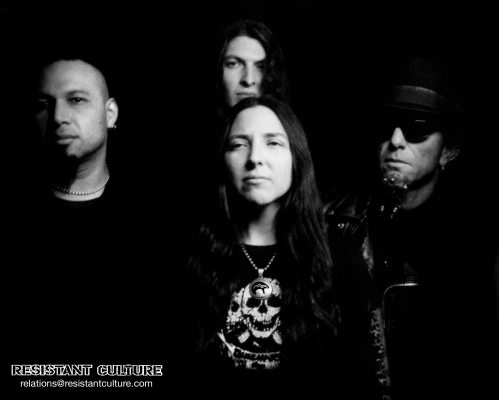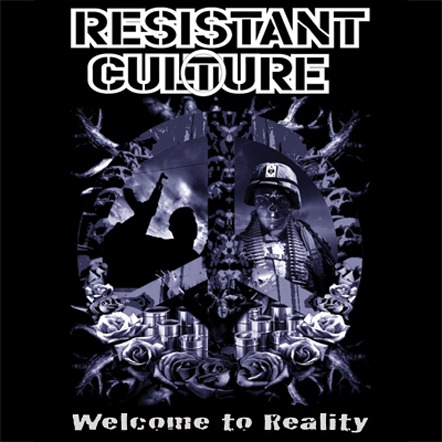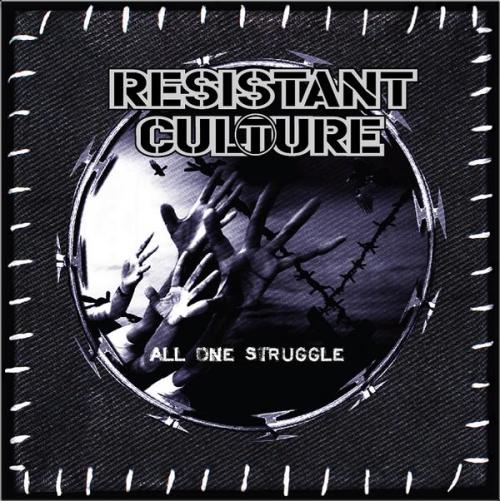Resistant Culture, Welcome To Reality (2005) & All One Struggle (2008)

Pissed off, and ready to grind (Apologies to Darkthrone)
The ever-charming folks on the Texas Board of Education have recently reared their curmudgeonly heads once more, introducing a resolution which would, according to the New York Times, send a blunt message to textbook publishers: “Do not present a pro-Islamic, anti-Christian version of history if you want to sell books in one of the nation’s largest markets” (New York Times, 9/22/10).
What any of this may have to do with tribal crust death/grinders Resistant Culture may be a little oblique, sure, but the point is this: historical revisionism is alive and well in our fair land. The same sort of revisionism, say, that gives us a first Thanksgiving in which the pilgrims just came ‘round to offer the indigenous peoples of the New World a nice cup of tea, or through which our collective relief at the peaceable collapse of the Soviet Union and the end of the Cold War allows for the gradual erasure of the myriad tyrannies and imperial ventures underwritten in the name of freedom.
Righteous indignation at the brutal treatment and oppression of indigenous peoples throughout the Western Hemisphere is, in fact, the spark which lights the raging fire of Resistant Culture’s seriously pissed-off grind attack. While much bandied-about in discussions of Resistant Culture, the influence of indigenous folk music instrumentation and chants is relatively subdued. The band’s two full-length albums are being reissued and repressed in advance of their upcoming American tour, providing a choice opportunity for having one’s head amply knocked around by the sort of politically-inclined metal that seems, sadly, to be in shorter supply these days.
2005’s Welcome To Reality and 2008’s All One Struggle both provide ample evidence of the band’s tight grasp on the classic everything-in-the-pot style of the early development of grindcore and death metal, when neither had exactly coalesced into ruthlessly ghettoized genres stuffed full of stock ideas and tired riffs. Resistant Culture straddles perfectly these lines between grind and death in the same fashion as genre progenitors Napalm Death, Terrorizer, Bolt Thrower, and all the other usual suspects. In Resistant Culture’s case, rather than tilt wildly from grind to death in separate songs, the overall approach seems to show songwriting chops and an instrumental attack that is rooted in classic grindcore, but with a guitar tone and riff construction that leans more toward the fetid tonalities of death metal.
Vocalist and long-time band mastermind Anthony Rezhawk (he, also, of vocal duty on Terrorizer’s long-delayed sophomore album, Darker Days Ahead – hence the participation of the late Jesse Pintado on 2005’s Welcome To Reality) demonstrates a much more varied vocal approach than many other acts in this style. Rezhawk’s most frequent style is a low-pitched yet strikingly understandable grind/punk bellow, yet he also occasionally pushes into higher-pitched rasping, and every now and again breaks out a deep, almost gothic style of clean incantation.
——————————————–

Welcome To Reality
Of the two albums up for review here, it’s 2005’s Welcome To Reality that really grits its teeth and gets right down to the serious business of wrecking your ears. The guitar tone is thick, but its attack is clean and clinical, whether trading in three-chord punk blasts, nimble grind explosions, or stolid, occasionally tremolo-ed death metal stomping. The bass tone oozes through in a delectably thick outpouring, like molten lava forcing its way through cracked tectonic plates. See “It’s Not Too Late,” especially, or the opening passage of “The Gathering” for some real floor-rattling bass thunder. The drums roll and clatter along with the requisite punk fury, slipping into blastbeat passages here, or verging on the classic Discharge d-beat there.
“Forced Conformity” locks into a wonderfully gritty, grooving pace with some sweet guitar noodling. If only more followers of Sepultura circa Chaos A.D. or Roots would have taken the their Brazilian lessons in this direction rather than resorting to the widespread pilfering of the knuckle-draggingly unattractive components of the tribal thrashers’ sound, maybe we wouldn’t now look to Sepultura’s mid-90s experimentation as pivotal in having incited the life-sapping abominations of nu-metal.
It’s not until the track “Elder Wisdom” that the much-touted indigenous folk music influence is on display in a way other than brief sections of native chanting. The acoustic guitar and flute interlude is a nice breather between the no-nonsense brain-stomping of the rest of the album. The rest of the album keeps things classy and well-apportioned, in equal measure causing the listener to pump her fist furiously to punk shout-alongs (“Victims of a bloody system!!” is just insanely fun to bellow alongside Rezhawk) and headbang recklessly to thrashing death metal riff-splosions. Hell, on “Civilized Aggression,” Rezhawk even sounds vaguely like Abbath gone crust, while on “The Gathering,” we get that deep, gothic delivery in the vocals to match the Eastern-scaled doom/death march.
In grindcore’s great tradition, the album makes effective use of sampled dialogue and other found sounds, without ever quite lapsing into overreliance. The sound here is much thicker than most crust metal, although the ethics and aesthetics underwriting the music have a much clearer kinship to crust and punk than to the varied lineages of death metal. After thrashing through a grin-inducing cover of Discharge’s “Hear Nothing See Nothing Say Nothing” and one of the album’s highlights in “The Gathering,” it’s finally on album closer “Land Keeper” that the indigenous folk is blended organically with the heavy metal, where on most of the rest of the album, the folk influences were generally sequestered into interludes.
Seventeen tracks in thirty-four minutes is just about perfect for this sort of classic grinding attack, and leaves the listener winded and shell-shocked
Overall rating, Welcome To Reality: 80%. Not reinventing the wheel, but careful saying that ‘round them, as you may find said wheel quickly and unceremoniously shoved down your throat.
————————————————–

All One Struggle
The follow-up to Welcome To Reality came three years later, with 2008’s All One Struggle. In comparison to the incendiary 2005 album, this one comes off slightly the worse, but for somewhat paradoxical reasons. See, All One Struggle actually features a fair portion more of straight-ahead blasting than did Welcome To Reality – album opener “Beneath the Concrete” does nothing to announce its presence before barreling into being, which ought to mark it out as ferocious and unexpected. Instead, it seems predictable.
The biggest problem, really, is that the album takes far too much time to gain any real, sustained momentum. An interesting riff pops up here and there, and the drums frequently lock into a furious blasting groove, but there is little use of the tension and contrast between the songs that made Welcome To Reality’s similarly straight-forward metal approach add up to a greater whole.
Still, by the time “Mending the Hoop” and “Natural Law” swing around, it’s time for some clenched-jaw mayhem. “Generations” is another brutal grinder, but it’s actually not until the pairing of “Stagnation” and “Rise Above Despair” that the tenor of the album finally switches the unrelenting pace I’ve been craving all along. And for those of you keeping score at home, that pairing doesn’t pop up until tracks 13 and 14 out of 17; too long to keep the expectant grind freak in ‘standby’ mode.
None of this is to suggest, however, that the album is some sort of unmitigated disaster (the “St. Anger Singularity,” we might say). “Contamination” whips up my appreciative ire with sections of tremolo-picked harmonies that flirt with the darkness and flair of black metal, capped with an ambient outro that leads quite nicely into the folk-tinged “New Sun.”
The overall sound of Resistant Culture remains essentially unchanged here from the previous album. If you imagine combining the thick, ritualistic tom abuse of Neurosis with the early thrashing fits of death/grind in the 1989 mold: Terrorizer’s World Downfall, Bolt Thrower’s Realm Of Chaos, and even whatever you’d care to call the midpoint between Napalm Death’s From Enslavement to Obliteration and Harmony Corruption (which, out in ’88 and ’90, respectively, give us an average of 1989, natch). I still feel a bit iffy about using the term “tribal” to describe the band’s drumming and use of indigenous folk musics, but the band itself embraces such language in its own press materials, so I shan’t protest.
Where Welcome To Reality was masterfully sequenced and paced, this album takes far too long to get into gear for my taste; when it finally does hit that sweet spot towards the end of the album, though, it throws another batch of classically-structured and well-hybridized grind/metal/punk right in my scoffing, skeptical face. Serves me right.
On a rather odd note, the final track of the album is most strikingly reminiscent not of anything on Earache’s roster from two decades ago, but rather of Sweden’s own completely unfuckwithable malcontent, Bathory. For starters, the track is called “The Return,” which obviously makes me want to climb a great craggy mountain and proclaim “It’s the RETURN of the darkness and evil!!!” Apart from the nomenclature, though, take a second to just let the Resistant Culture track sink in. It’s a fully ambient track, featuring a bed of flute, wind sound effects, along with sparse chanting and tribal percussion. In the back, though, is a muted yet insistent bass drum beat. Got it in your head? Okay, now run and grab your Bathory records. Take a spin through that outro track on nearly all of them (it’s on the debut through Twilight of the Gods, and again on Blood On Ice and Nordland II). Of course it’s not exactly the same thing, but the Bathory outros all feature a single ambient tone, while in the distance, a single bass drum tolls out a slow recitation of doom. I can’t help but think of this as an homage, even if it was unintentionally done.
After all, everyone needs more Bathory in her life.
Overall rating, All One Struggle: 65%. If you dig the former, you’ll still dig this latter platter, though I find the former warmer.
———————————————-
Resistant Culture is currently gearing up for what they are calling the Sacred Fire Tour throughout these United States. The tour coincides with reissues on Seventh Generation Records: All One Struggle on vinyl, and a third pressing of Welcome To Reality on CD.
The Sacred Fire Tour kicks off next week, with dates as follows. If you happen to live in the Chicago area, you would be especially well-advised to check out Resistant Culture’s date here on October 9th, as they are participating in the fourth iteration of the Apocalyptic Crust Fest. Resistant Culture will be playing the third and final day of the festival, alongside Phobia and Dropdead. Check out more information on Apocalyptic Crust Fest here.
9/30 Wandering Goat
Eugene, OR
10/1 Satyricon
Portland. OR
10/2 The Morgue
Seattle, WA
10/5 Roman’s
Rapid City, SD
10/7 Rathole
Minneapolis, MN
10/9 The Black Hole
Chicago, IL
10/12 Token Lounge
Detroit, MI
10/13 Hexagon Space
Baltimore, MD
10/14 Millcreek Tavern
Philadelphia, PA
10/15 The Lake Underground
Brooklyn, NY
10/16 AS220
Providence, RI
10/17 Cambridge Elks Lodge
Cambridge, MA
10/19 Volume 11 Tavern
Raleigh, NC
10/20 Lenny’s
Atlanta, GA
10/21 Marauders
New Orleans, LA
10/22 Broken Neck
Austin, TX
10/23 No Thanks Fest
Emory, TX
10/24 The White Swan Live
Houston, TX
10/26 Blast O Mat
Denver, CO
10/27 One Mind Studio
Salt Lake City, UT
10/28 Lucky Lady
Las Vegas, NV
10/29 Gilman
Berkeley, CA
11/6 Common Ground
Riverside, CA
—————————-
One cannot help but be reminded and enraged, after working through these Resistant Culture albums, of the plight of Native Americans and other indigenous peoples (First Nations, or whatever else you’d like to call them). This history of ruthless political exploitation and callous disregard is clearly a topic ripe for the politicized fury of punk and grindcore, but it also seems that the musical and cultural influence of these diverse communities has much to offer to heavy metal by way of artistic and aesthetic exploration. There are only a few contemporary albums that bring to mind these influences, most notably Tomahawk’s Anonymous, and Nechochwen’s brilliant 2010 album, Azimuths to the Otherworld. Resistant Culture is absolutely dissimilar in musical approach to either of those acts, of course, but I suspect this is fertile ground for a shared ethical and aesthetic approach.
The challenge, of course, is to pay tribute to this history and to the heritage of these indigenous peoples without coopting or tokenizing them. Heavy metal may not be particularly well sensitized for such a task, but the political and artistic potential is tremendous. Historical revisionism, after all, can only succeed when a complacent mainstream culture grows tired of calling ‘bullshit’ on the lies and omissions of officialdom.
The New York Times ran another story, just the other day, on what seems essentially like racial segregation and the production of guilt-allaying ‘native’ pageantry at the Pendleton Round-Up rodeo event in Pendleton, Oregon. The author of the story writes, “A century later [from the beginnings of this event], the mill still provides blankets, and families are still paid to appear, $5 per person each day at the arena. Beef and vegetables are provided, as are tokens for other food. The winner of the ‘Best Dressed Indian Award’ at the parade gets 50 silver dollars” (New York Times, 9/23/10).
Blankets. Think about that.

"Get the fuck outta here," says the horse
Read Full Post »












